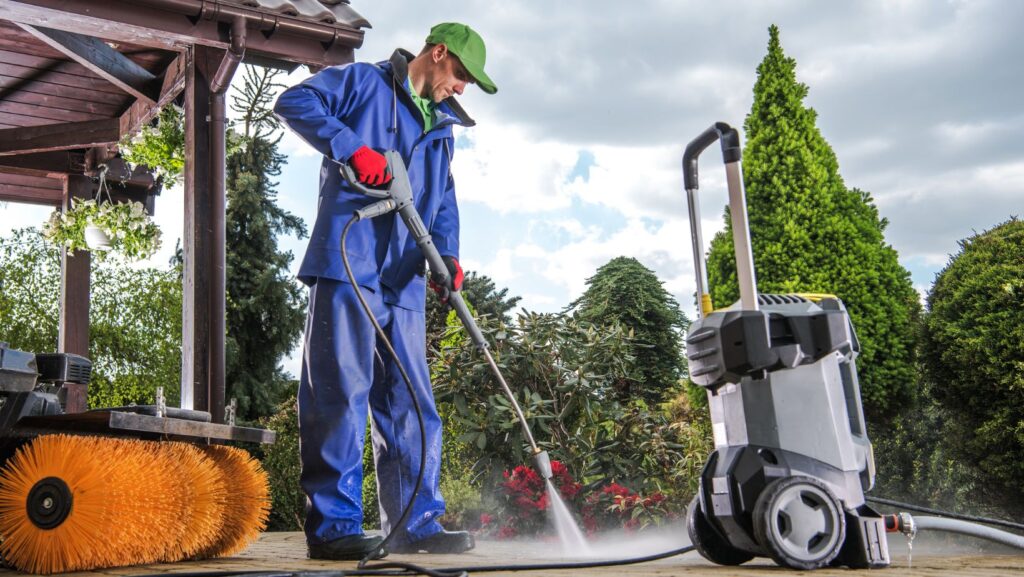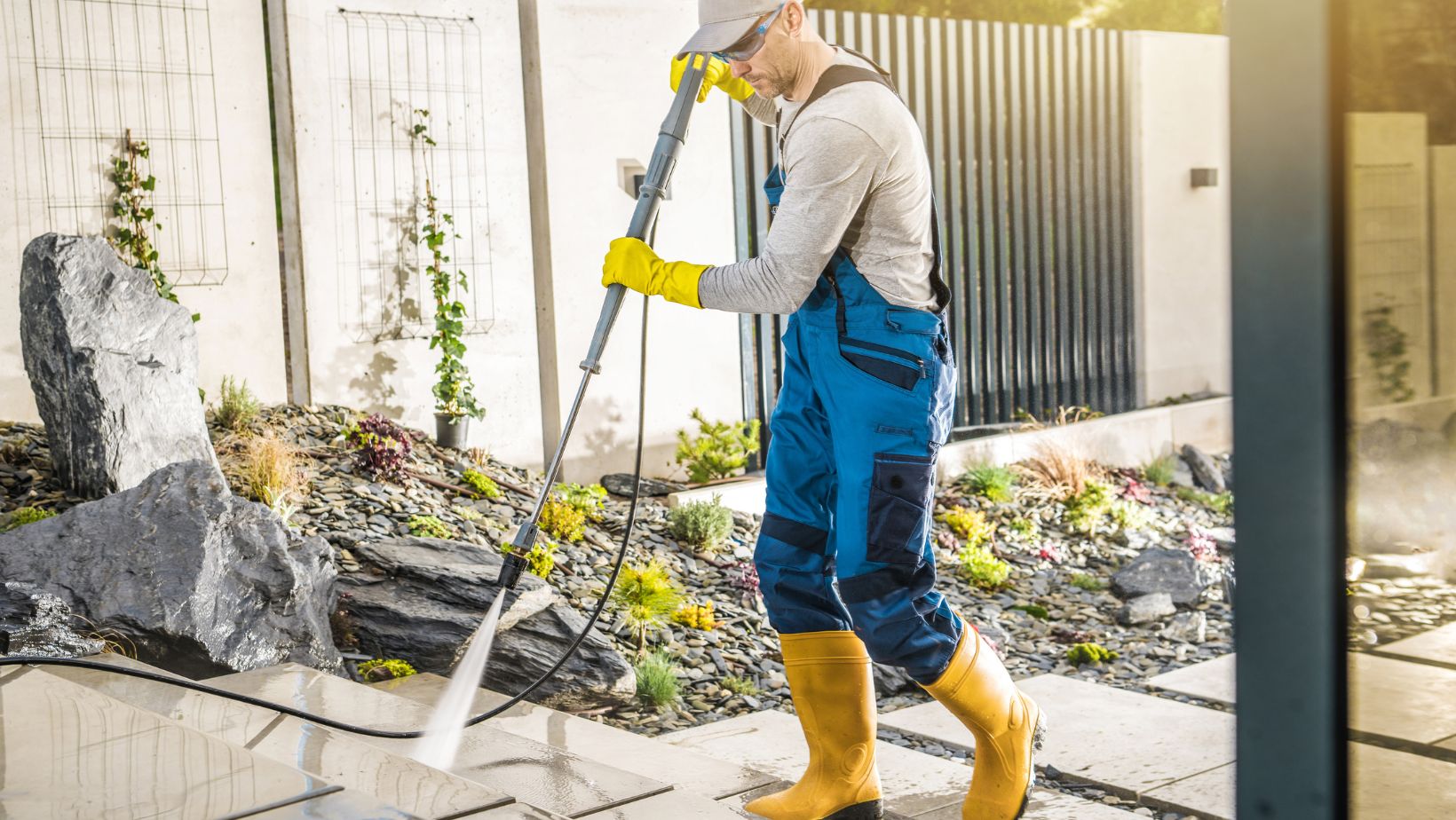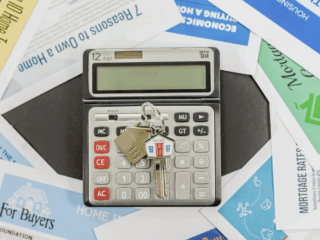
Have you ever walked past a home or business and thought, “Wow, that place looks brand new”? Chances are, the secret wasn’t a fresh coat of paint but good old pressure washing. Whether it’s dirt on your driveway, algae on siding, or grime on decks, exterior cleaning makes a massive difference.
In this article, we’ll dive deep into the world of pressure washing and exterior cleaning, exploring benefits, methods, costs, and even local insights from places like Akron, Ohio. Plus, if you’ve been searching for reliable power washing services, you’ll learn what to look for.
1. What is Pressure Washing?
Pressure washing is the process of using high-powered water spray to remove dirt, grime, mold, and other debris from outdoor surfaces. Imagine it as giving your home or property a deep-cleaning shower. Unlike regular garden hoses, a pressure washer packs a powerful punch, blasting away years of buildup in minutes.
2. Why Exterior Cleaning Matters
First impressions matter. A clean driveway, shining siding, and spotless deck don’t just look good—they make your home feel more welcoming. Think of your property as a book cover. If it’s dirty, people might assume the inside is neglected too. Beyond aesthetics, dirt and mold can actually cause damage over time, leading to costly repairs.
3. Pressure Washing vs. Power Washing
People often use these terms interchangeably, but there’s a subtle difference.
- Pressure Washing: Uses cold water under high pressure.
- Power Washing: Uses heated water, making it more effective against stubborn grease and salt.
If you’re removing moss from a patio, pressure washing works. If you’re tackling oily stains on concrete, power washing might be your best bet.
4. Common Areas That Need Pressure Washing
Where can you use pressure washing? Pretty much anywhere outdoors:
- Driveways and sidewalks – Say goodbye to oil stains and chewing gum.
- Siding and brick walls – Remove algae and dirt buildup.
- Decks and patios – Perfect for prepping before staining or painting.
- Roofs – Gentle washing can clear moss and prevent leaks.
- Fences – Keep wood or vinyl looking sharp.
5. Benefits of Pressure Washing for Homeowners
Pressure washing isn’t just about looks—it’s also about protecting your investment.
- Boosts curb appeal – A cleaner home sells faster and for more money.
- Prevents damage – Dirt and mold eat away at surfaces.
- Health benefits – Removes allergens like mold, pollen, and mildew.
- Saves money – Regular cleaning delays expensive repairs.
Think of it like brushing your teeth. It’s not just for a bright smile, but also to prevent cavities.
6. Environmental Advantages of Exterior Cleaning
You might wonder: “Is blasting water wasteful?” Actually, pressure washing can be eco-friendly. Many services use biodegradable cleaners and less water than a garden hose would over the same job. Removing mold and mildew also creates a healthier environment around your home.
7. DIY Pressure Washing: Pros and Cons
If you’re handy, you might consider renting a machine and tackling the job yourself.
Pros:
- Lower upfront cost.
- You control the process.
Cons:
- Risk of damaging surfaces.
- Safety hazards from high-pressure spray.
- Time-consuming without experience.
It’s like cutting your own hair—you can do it, but you may regret the results.
8. Hiring Professional Power Washing Services
This is where experts come in. Professional power washing services bring commercial-grade equipment and years of experience. They know the right water pressure for different surfaces and can finish in a fraction of the time it takes a DIYer. Plus, pros are insured—so if something goes wrong, you’re covered.
9. How Often Should You Pressure Wash Your Home?
A general rule of thumb is once a year, but this depends on your environment. Homes in humid areas may need it more often due to mold, while dry climates require less frequent cleaning. After big weather events, like storms, it’s also smart to give your home a wash.
10. Pressure Washing in Different Climates
- Humid Regions: Mold and algae grow quickly—wash more often.
- Cold Climates: Salt from snow removal can damage concrete—wash in spring.
- Dry Areas: Dust and sand buildup—wash to prevent scratching surfaces.
11. Pressure Washing in Akron, Ohio: Local Insight
In cities like Akron, Ohio, where weather swings from snowy winters to humid summers, pressure washing is especially useful. Salt from icy roads can stain driveways, while summer humidity fuels algae growth on siding. Regular exterior cleaning helps homeowners keep their properties looking sharp despite the changing seasons.
12. Safety Tips for Exterior Cleaning
- Wear protective goggles and gloves.
- Avoid using ladders while pressure washing—use extension wands instead.
- Never spray electrical outlets or wiring.
- Be cautious around delicate materials like old wood or shingles.
13. Costs and Value of Pressure Washing
Costs vary depending on the job, but here’s a ballpark:
- Driveways: $100–$250
- Siding: $150–$400
- Decks & Patios: $100–$300
While it may seem like an expense, the return on investment comes in the form of higher property value, lower maintenance costs, and a better living environment.
14. Myths About Pressure Washing
- “It’s only for looks.” Wrong—it prevents long-term damage.
- “It’s too expensive.” The cost is often less than a minor repair.
- “I can do the same with a garden hose.” Not even close—the power difference is huge.
15. Final Thoughts: The Lasting Impact of Clean Exteriors
At the end of the day, pressure washing is more than a quick clean—it’s an investment in your home’s health and value. Whether you live in Akron, Ohio, or anywhere else, keeping your property clean inside and out is essential. And sometimes, calling in power washing services is the smartest move you can make.
FAQs
- How long does a pressure washing job take?
Most residential jobs take 2–4 hours, depending on the size of the property. - Can pressure washing damage paint or siding?
Yes, if done incorrectly. Professionals adjust pressure to match the material. - Is pressure washing safe for pets and plants?
When using eco-friendly cleaners, yes. Always check with your service provider. - What’s the difference between soft washing and pressure washing?
Soft washing uses low pressure with detergents, ideal for delicate surfaces like roofs. - Do I need to be home during pressure washing?
Not necessarily, but it’s recommended for first-time services to answer any questions.













